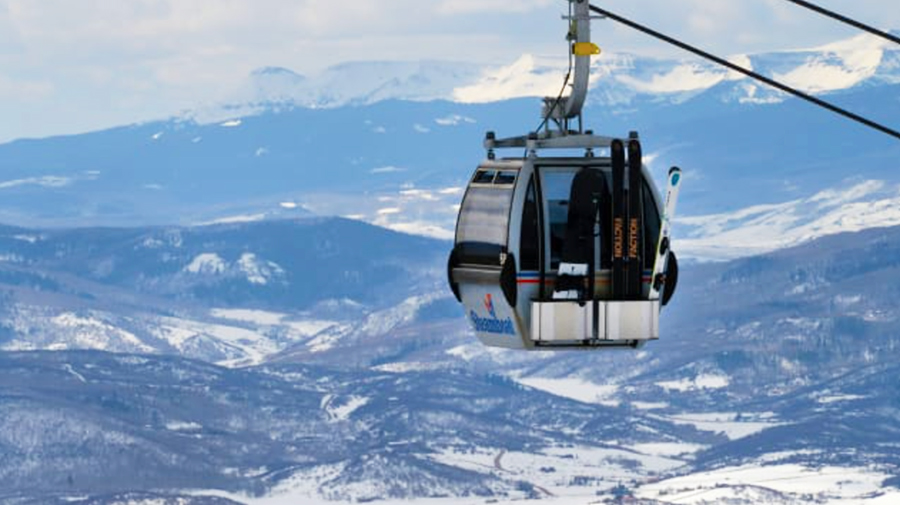Vail Resorts, North America’s largest ski resort operator, saw record sales of Epic Passes, but overall sales in the fiscal first quarter ended October 31 declined 50.8 percent, and CEO Robert Katz warned investors of a “very challenging” 2020/21 North American ski season ahead as COVID-19 cases spike across the country.
“There is no doubt that operationally this will be a very challenging season ahead,” Katz told analysts on a conference call. “Broadly speaking, we feel really good about where we sit, given, again, the environment we are in.”
In the quarter ended October 31, total revenue decreased to $131.8 million, down from $267.8 million a year ago. The net loss was $153.8 million, or $3.82 per share, up from a net loss of $106.5 million, or $2.64, a year ago.
The reported EBITDA loss in its Resort segment was $94.8 million for the quarter compared to an EBITDA loss of $76.7 million a year ago. The higher loss reflected the negative impact of COVID-19 that was partially offset by disciplined cost management, including reductions in wages, salaries and seasonal labor. The latest quarter also benefited from $15.4 million of lift revenue recognized associated with the expiration of the credit offers to 2019/20 pass product holders.
One bright spot were sales of Epic Passes reaching a record 1.4 million, a 20 percent increase over last season. Earnings from those sales were flat, however, compared to the previous year as the company set aside $121 million to reimburse pass holders because of the early end to last season in March when COVID-19 emerged.
Katz said, “We are very pleased with the growth in our season pass program, particularly given the challenging circumstances surrounding the impact of COVID-19. We expect that the total number of guests on all advanced purchase passes this year will exceed 1.4 million, including all passes for our North American and Australian resorts demonstrating the significant loyalty of our guest base and the strong demand for our Mountain resorts.”
However, Katz indicated COVID-19 has significantly disrupted business across resorts.
In Australia, Hotham and Falls Creek remained closed for the entire quarter, resulting in a significant decline in revenue compared to the prior period. At Perisher in Australia, visitation trends improved relative to July as resorts opened but capacity constraints held back visitations.
In North America, U.S. resorts experienced improved demand from leisure travelers throughout the quarter relative to the fourth quarter, but summer visitation remained “well below historic levels,” said Katz. At Whistler Blackcomb in Canada, demand remained “significantly below” prior-year levels due in part to travel restrictions, with the Canadian border remaining closed the entire quarter to international guests, including those from the U.S.
Katz said, “We continued to maintain disciplined and rigorous cost controls throughout the quarter to partially mitigate the reduced revenue levels.”
Reduced Travel Demand Expected To Depress Resort Visitations
Regarding its fiscal year outlook, Michael Barkin, CFO, said that Vail Resorts continues to expect “material declines” in visitation to resorts and associated revenue declines in fiscal 2021 relative to original expectations for fiscal 2020, primarily as a result of expected declines in visitation from non-pass lift ticket purchases due to reduced destination visitation with steeper declines among international guests.
“While we expect that mandated capacity limitations will have a negative impact on our visitation during peak periods, we expect the primary driver of visitation declines for the North American ski season to be a result of reduced travel demand,” said Barkin.
Barkin said Vail Resorts expects additional negative impacts to visitation in select regions where heightened restrictions exist, including Whistler Blackcomb given Canadian border closures and domestic travel guidance and Vermont as a result of the quarantine policy for out-of-state travelers.
COVID-19 limitations and restrictions are also expected to significantly impact food and beverage and ski school businesses. In ski school, group sizes have been reduced and full day and other select lesson types have been eliminated at some resorts in response to COVID-19 limitations.
Vail Resorts has total cash and revolver availability as of November 30 of approximately $1.2 billion with $614 million of cash on hand. As of October 31, net debt was 4.1 times trailing 12 months total reported EBITDA. Said Barkin, “We continue to expect to have sufficient liquidity to fund operations through at least the 2021 or 2022 ski season even in the event of extended resort shutdowns.”
















